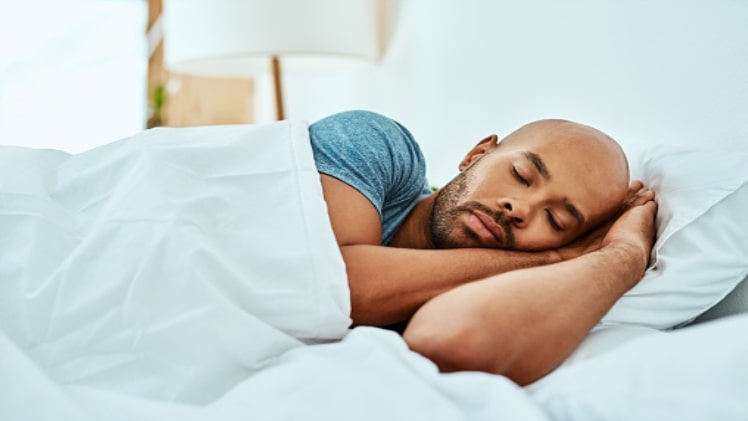The modern world is full of distractions, which make it difficult to stay focused on the important things. If you’re struggling with sleep, it’s time to rethink your priorities. Just one night of deep sleep can completely turn back the clock on cognitive abilities and physical health. Here are some steps you can take to create a space that will encourage better sleep, as well as ways for incorporating healthy scheduling into your lifestyle–and see how much better you feel!
Why It’s So Important To Take Steps To Get A Better Night’s Sleep
It’s no secret that sleep is important. Getting enough sleep can make you feel less stressed, decrease your risk of obesity, reduce the likelihood of depression and anxiety disorders, and even help to boost your immune system. It’s because of these benefits (and more!) that it’s so important to take steps to get a better night’s sleep.
Today we’re going to talk about why it’s so important that you get enough sleep every night and get a proper deep sleep cycle. Learn what steps you can take in order to accomplish this task.
What Happens When You Don’t Get Enough Sleep
Getting enough sleep is important for your physical, mental and emotional health. When you don’t get enough sleep , your ability to process information and make decisions becomes impaired, increasing the likelihood of mistakes at work or school. You also tend to become more irritable and impatient, affecting your relationships with friends, family members and colleagues. bundlenews
The negative effects of not getting the sleep you need include fatigue, lack of focus and a tendency to overeat. A few studies have revealed that sleeping less could cause weight gain as it boosts levels of cortisol. It’s a stress hormone that causes you to feel hungry throughout the daytime. If you’re getting enough hours of rest each night, you’ll feel more alert and focused. Insufficient sleep can result in grave safety issues including injuries or accidents at the workplace. REM sleep has many advantages that can boost your health. These include:
- 1. Better brain function
- 2. A steady state of mind (no changes in your mood)
- 3. Energy – both mental and physical
- 4. Healthy heart and lung function
- 5. A stronger immune system
If you’re experiencing insomnia or get up multiple times during the night, and are unable to fall asleep, adopt proactive measures to help create a peaceful atmosphere that is relaxing and comfortable. Learning techniques to manage stress and learning to manage anxiety will assist in improving your sleep. Disconnecting your mobile before sleep can help to aid in a better sleep.
How Long Should You Sleep Every Night?
You should try to get 7-9 hours of sleep every night. This recommendation is based on the fact that 25 percent of your total brain energy usage occurs during each stage of sleep.
This means that if you have the average amount of sleep each night, your brain will automatically consume enough energy to be at full strength and make the most important decisions while awake. If you get less than 7 hours of sleep, your brainpower is significantly reduced, potentially reducing your ability to work productively.
Also, always take note that you do not sleep in a saggy mattress as sagging mattress impairs sleep quality.
What Happens If You Overdose On Sleep?

Just as too little sleep can impair your brain function and cause you to overeat, so can too much sleep. If your sleep is less than 7 hours long, it’s possible that your brain won’t have enough energy to process information and make the most important decisions for you. If this is the case, you may find yourself making poor decisions such as eating junk food or turning down a job opportunity.
In addition to causing you to make poor decisions, not getting enough sleep can also have serious health consequences that may surprise you.
Some More Helpful Tips for Getting A Good Night’s Sleep
A good quality sleep is an integral part of a healthy lifestyle; but with the hustle and bustle of modern-day life, it can be hard to get the necessary amount. Luckily, there are many tips that can help you get that perfect night’s rest. Here are some tips that will help you sleep better:
- Exercise Regularly: Exercise has numerous benefits, not just to your body, but to your mind as well. Regular exercise helps with the drowsiness usually associated with sleep and can help you fall asleep faster. A good rule of thumb is that to get an extra hour of sleep on a regular basis, it takes an hour off your exercise time.
- Avoid Alcohol And Caffeinated Drinks Before Bedtime: Caffeine, on the other hand, is a stimulant and will keep you awake. If you tend to drink caffeinated drinks after dinner, cut it out before bedtime. Instead of drinking alcohol, opt for a glass of warm milk before bedtime.
- Avoid Nicotine And Alcohol In The Evenings: These are known to stay with you longer than the others and can make it difficult to fall asleep. Cutting back on these altogether can help a lot.
- Have A Relaxing Evening Routine: Avoid doing anything stressful before bedtime; instead, have a relaxing evening of reading, cuddling with your loved ones, or watching an enjoyable movie. This will leave you in the mindset that it’s time for sleep rather than “time to be done with tonight.”
- Move Your Body At Least 30 Minutes Every Day: Just walking around a bit will help you fall asleep quicker and sleep better at night.
- If You Are Having Trouble Sleeping, Stay Cool: Try to get outside as soon as possible and expose yourself to fresh air; it’s also a great way to clear your head so that you can relax and fall asleep faster.
- Avoid Eating Heavy, Rich Foods Before Bedtime: Heavy foods can cause difficulty in falling asleep. Try to stay away from large meals, especially ones with a lot of meat.
- Set Your Cell Phone To Vibrate On The Nightstand: This will give you a chance to place the phone farther away from you and will help reduce the chances of sleep interrupting your bedtime ritual.
- Get A Sound Machine And Play It Low In The Bedroom: Not only are these great for helping you relax, but they will also drown out any noises that may be keeping you awake.
- Avoid Strenuous Exercise Before Bedtime: If you like to exercise early in the day, try to avoid it close to bedtime. The extra exertion can keep you up, and having a long night’s sleep can be difficult.
- If you are a person who tends to wake up during the night, try sleeping on your side . You are less likely to wake up and need more sleep when sleeping on your back. For more convenience, you can get the best mattress for side sleepers.
- Increase your intake of magnesium-rich foods.
Conclusion
Sleep difficulties can have an impact on your fitness and your intellectual well-being. If you set up a blissful bed room that makes use of calming colors, cooler temperatures, and dim lights, this has to assist you fall asleep quicker and for longer. However, there are masses of different matters you can do to ride a desirable night time of relaxation at home. tunai4d

